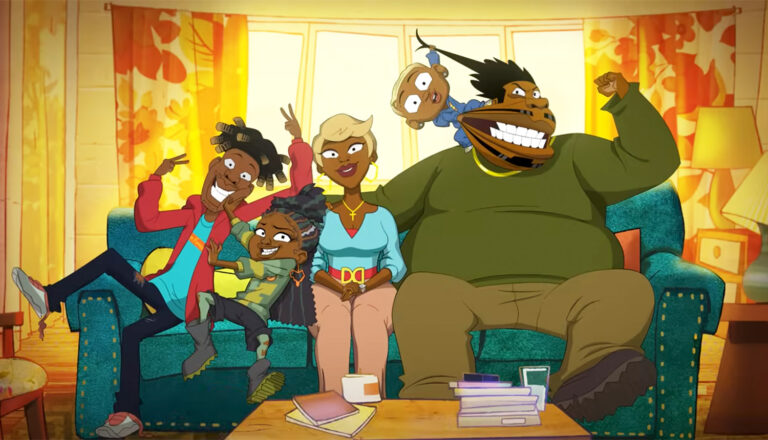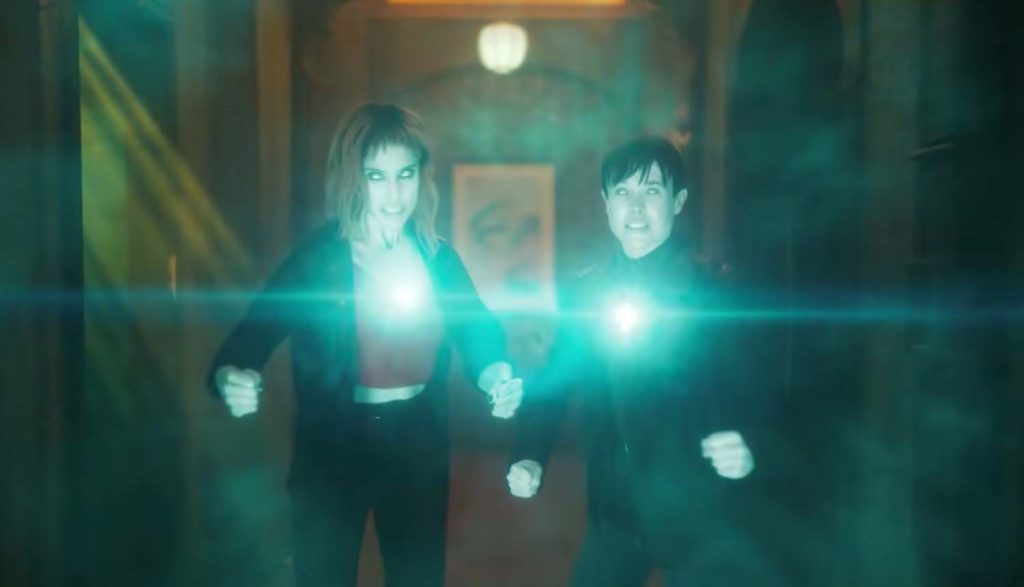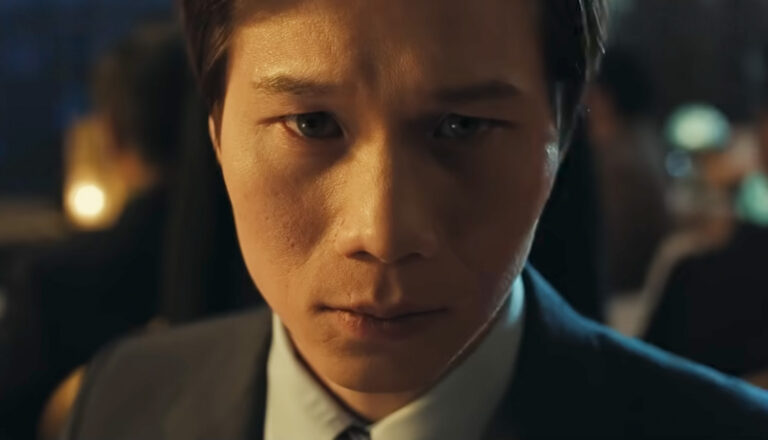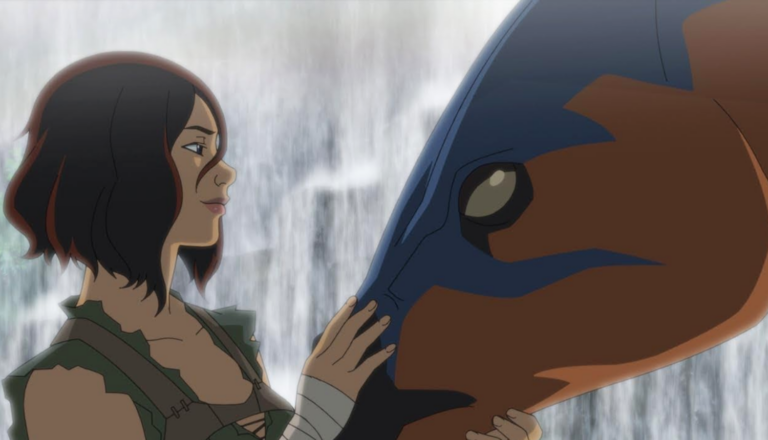
Good Times
Netflix takes a classic sitcom, Good Times, and turns it into a vulgar, violent, sexually-charged TV-MA show.

Parenthood is an imprecise science. None of us gets it exactly right. But most of us, thankfully, come closer than Sir Reginald Hargreeves.
Hargreeves wasn’t what you would call particularly loving. Or affectionate. Or tolerant. He didn’t seem to like kids much at all, in fact—which makes you wonder why he took the trouble of adopting seven of them.
Oh, they were seven special children, admittedly. The fact that they were born on the same day would be merely unusual. The fact that they were born to women who, that very morning, hadn’t even been pregnant made them remarkable.
So Sir Reginald—the world’s most eccentric, reclusive billionaire—tracked them down, paid their birth mothers handsomely and took them all home, pushing them into a rigorous training regimen designed to hone their special gifts to a fine edge and to turn them into the greatest collection of (let’s just say it) adolescent superheroes this side of the Charles Xavier School for Gifted Youngsters.
Alas, things didn’t work out according to Sir Reginald’s design. Most of his numbered adoptees rebelled, with one even writing a tell-all biography. All of them walked out of their adopted father’s life. Only when Sir Reginald mysteriously died did they return—just in time to prevent a cataclysmic future that, by happenstance, they caused.
After realizing that the events leading up to the apocalypse started years before (back when they were still wearing domino masks and fighting crime together), the former members of the Umbrella Academy decided to travel to the past to fix their mistakes.
By Season Three, the group has successfully stopped not just one, but two, world-ending events (both of which are, in one way or another, their fault). So when the members finally get back to their proper time, they’d love nothing more than to just sit back and relax.
Except, as the trend of apocalyptic events indicates, there’s a problem: in this timeline, they were never born. And the universe is going to find a way to sort that out—one way or another.
After surviving two apocalypses together (not to mention their hectic and problematic upbringing), the brothers and sisters have learned (more or less) to set aside their petty squabbles. But as it turns out, time travel is a finicky science, and after the siblings come back to the present, they’re met with an alternate reality—one where Hargreeves never adopted them in the first place. Instead, he’s trained up a different group of super-powered rugrats—called the Sparrow Academy, leaving our dysfunctional group of protagonists scrambling to figure out what has happened.
What’s worse is that their existence on this alternate timeline is bad news—as in, it’s a paradox. In this timeline, they can’t exist because they were supposedly never born. But because they do exist, they’ve unintentionally brought with them a chaotic ball of energy that’ll slowly grow to destroy the whole universe. Apparently, the group spawns apocalypses like they’re going out of style.
That’s not to mention the fact that our Umbrella Academy members are no longer playing on their own turf—and the Sparrow Academy members aren’t keen on sharing.
The Umbrella Academy saw its own birth back in 2007 in the pages of a Dark Horse Comics limited series. And while some details have changed, most of its characters, as well as the franchise’s darkly comic vibe, have now migrated to Netflix, itself home to a staggering collection of motley characters and weird tales.
While this is a show about “superheroes,” its protagonists are only sporadically heroic. Sometimes—perhaps often—they’re anything but. Diego fights crime, sure, but he does so by shedding a great deal of blood, and he has little remorse over the occasional death. Klaus’s own ability to commune with the dead may have twisted his psyche irreparably: He’s an addict who rarely strays far from a filled brandy snifter, a lit cigarette or a baggie of drugs. Oh, he’s gay, too (and Vanya is bisexual and, as of Season Three, transgender), with a penchant for occasionally wearing his sister’s skirts. No. 5 may look like a 13-year-old boy, but he’s really a 58-year-old man—and judging from the mouth on the kid, he spent most of it in the Merchant Marine Corps.
All of them obviously have their own foibles and failings. Most of them have a hard time getting along with their fellow siblings. But when it comes to saving the world, most also seem ready to get on board. If it’s not too inconvenient, of course.
But should viewers get on board with the show? The levels of violence we see in The Umbrella Academy seem to strain the boundaries of the TV-14 label Netflix stuck on it. It’s bloodier, I’d say, than Netflix’s recently departed Daredevil and Luke Cage, both of which carried a TV-MA rating. Why the more kid-friendly rating? I can only guess it’s because while Daredevil felt gritty and real, The Umbrella Academy has the ludicrous tang of a fan-fic fever dream. It’s a little more outrageous and so … a little less impactful? (And we haven’t even gotten to the reported appearance of “God” in the show—depicted as a little girl on a bike.) By Season Three, we even get a plotline about rebuilding the very reality of the universe as new “creators”—one that’ll give religious viewers pause.
The newest content caution for the show comes thanks to Ellen Page, who plays Vanya. The Inception actress came out as transgender in 2020, causing many fans of The Umbrella Academy to wonder what that meant for her character. With Season Three of the show, we find that it entails Ellen’s Vanya becoming a “Viktor,” which will leave the controversial subject on the forefront for many parents to walk through with their children.
Combined with its strange spiritual themes and its heavy embrace of LGBT issues, The Umbrella Academy will be hard for many families to stomach. Even if the blood we see is too garish to feel real, that doesn’t make it any less grotesque when it spurts and flows freely. And even if the show wants us to laugh at the foul mouth of a 13-year-old boy, it doesn’t make the language any less foul.
The Umbrella Academy arrives back in their correct time, with one big caveat: in this present, their adoptive father chose to raise a different set of superpowered humans—the Sparrow Academy.
The members of the Umbrella Academy and Sparrow Academy fight one another with a large assortment of superpowers: a woman spits hallucinatory venom, a man kicks Luther’s chest repeatedly, a sentient cube sends out electrical shocks and much more.
Five has a vision of a mannequin and begins passionately kissing it. Luther makes a lewd joke. Klaus urinates out of a window, and he and Five reference getting alcohol. Klaus mentions the idea of sleeping with a doppelgänger. An android says she’s worshipping a ball of energy, and she says the energy has a “message from God.” The ball of energy begins to “dust” people away. A reference is made to Vanya’s lesbian relationship.
A boy and girl kiss. The girl rapidly grows pregnant via a magical beam of light and gives birth with many sounds. People drink alcohol. A man smokes. We hear a reference to condoms. The members of the Sparrow Academy are seen training shirtless or in sports bras.
The s-word is used 11 times. We hear “h—” and “d-ck” eight times each, and “a–” is frequently used as well. “D–n,” “b–ch” and “sl-t” are also heard. God’s name is misused twice.
After averting their doom in the apocalypse they caused in 2019 by time-traveling to the past, each of the Hargreeves siblings gets dropped in Dallas, Texas between the years 1960 and 1963.
The moon is blown up and pieces of it hit the earth, wiping out everyone in a fiery explosion. (The cataclysm is corrected via time travel.) Russian and American soldiers fight against each other with bombs and guns. Vanya uses her powers to force a missile to explode on the tank that fired it. Russian soldiers are attacked by ghosts summoned by Klaus. Tentacles coming out of Ben’s ghostly projection rip soldiers apart. Luther gets hit by a bazooka but is unharmed due to his powers. Diego uses acrobatics to avoid multiple bullets before throwing knives to kill his assailants. Allison causes several men’s heads to explode with her powers. Several nukes wipe out a city.
Several people are shot by assassins looking for the Hargreeves siblings. Diego knocks a man unconscious. Vanya passes out after getting hit by a car. Luther falls from the sky into a trash can. Two men punch, kick and headbutt each other in a fighting ring. Luther breaks a man’s arm when the man tries to stab him. Both receive several scratches on their faces and spit up blood. A woman knocks a man unconscious with a bedpan. Klaus gets punched in the face. Orderlies in a mental hospital threaten patients with batons, and Diego is manhandled by them before one injects him with a sedative. A man purposely dislocates his shoulder. Someone gets bitten. Allison stops a man from punching her husband before literally kicking him out of a building. A man pulls a knife to defend himself. Diego talks about killing Hitler. A man says he was assaulted when a door accidentally closes on his foot. Klaus tackles Ben and the two wrestle, slapping each other.
Allison and her husband dance and kiss. Two people come close to kissing. Several people watch a woman dancing in a strip club (though she is wearing old-fashioned underwear). Klaus is shirtless in several scenes. Allison cuddles with her husband on a couch. Klaus talks about being attracted to a magazine model. He also makes jokes about homosexuality and male genitals. A woman says her husband is a good man but also admits to secretly stashing away money in case he ever decides to leave her.
Allison is kicked out of a “Whites Only” restaurant. Diego stops a thief from stealing a woman’s purse. We hear about a woman dying from cancer. A doctor tells Diego he has a “hero complex” after learning about his troubled childhood. Someone mocks Diego’s daddy issues. Someone picks a lock to escape a mental institution.
People drink, smoke and gamble. Klaus steals a car and is later arrested. A woman sniffs something to get high off the fumes. We hear multiple uses of the s-word, as well as “h—,” “b–ch,” “a–hole,” “d–n,” “a–” and “p-ss.” We also hear some misuses of God’s name, once paired with “d–n.” Someone says, “son of a biscuit.” We hear a reference to pubic hair. Someone jokes about flatulence and irritable bowel syndrome. A man with a conspiracy theory about aliens asks about anal probes. A woman scolds her husband for cursing in front of their son.
Reclusive billionaire Sir Reginald Hargreeves dies mysteriously, and his five surviving/not-missing adopted children return to his mansion to pay their respects. Truth is, not many are respectful. Diego, now a knife-throwing vigilante, says Sir Reginald was a “sad old man who kicked it in a big empty house. Just like he deserved.” But big, brooding Luther suspects their father might’ve been murdered, and he wonders whether his brothers or sisters had something to do with it.
Luther and Diego get into a literal fight during their father’s memorial service, with Diego eventually slicing part of Luther’s arm. We also see Diego at “work,” killing or maiming several people (and saving an innocent family cowering nearby). He stabs, slices, breaks bones and pins someone’s hand to a wall with a thrown knife. No. 5, a child who disappeared long ago (and still looks 13), kills a bevy of would-be assassins in a donut shop. He does most of his damage with a butter knife—puncturing the eye of one of the assassins (blood gushes out of the wound), slicing and stabbing others and snapping the neck of one would-be survivor.
In flashback, we see Hargreeves’ kids as young teens in what might be their first public operation: One throws a bad guy out of a window and apparently to his death. Another of the children whispers a “rumor” into the ear of someone, causing him to repeatedly shoot his own partner. (We see the bullets hit, along with the blood.) Villains get thrown about and pummeled seriously, and one is stabbed in both shoulders with knives. Then, when a couple of bad ‘uns are left, No. 6 (now deceased) goes behind a closed door to reach them. We see the shadows of tentacles, hear screams and watch as blood splatters against the opaque windows. When Ben comes out, he’s covered in blood and says he wants to just go home now.
In an even earlier flashback, we see a woman in a pool, suddenly become pregnant as the swimming pool clouds over with blood. She delivers shortly thereafter. (Before that, she and an apparent beau flirt in their swimming suits.) Klaus, No. 4, wears a skirt he plucked from his sister’s closet (which he says is “very breathy on my bits”) and acts stereotypically effeminate. He also uses a variety of mind-altering substances: He drinks often, gets high (impeding his ability to communicate with the dead) and is shown buying drugs in a dark alley. No. 7, Vanya, also takes a pill, though perhaps for a medical condition.
No. 3, Allison, wears a slightly alluring outfit during a red carpet event. She mentions that she and her husband are on the way toward divorce, and that her husband got custody of her daughter.
The Hargreeves’ butler is a sentient and communicative chimpanzee who says his employer “made me what I am today,” quite literally. Klaus communicates with a dead person and extinguishes a cigarette in his father’s ashes. (“Thank Christ he wasn’t our real father,” Klaus says elsewhere.) We hear a reference to a “diarrhetic hippo.” In flashback, six of Sir Reginald’s seven children are forced to get painful tattoos. Someone mentions that eternal peace is “probably overrated,” and Klaus speculates his dead father is playing tennis with Hitler in hell.
Characters say the s-word about nine times. We also hear “a–,” “b–tard” and one misuse of Jesus’ name.


Kennedy Unthank studied journalism at the University of Missouri. He knew he wanted to write for a living when he won a contest for “best fantasy story” while in the 4th grade. What he didn’t know at the time, however, was that he was the only person to submit a story. Regardless, the seed was planted. Kennedy collects and plays board games in his free time, and he loves to talk about biblical apologetics. He thinks the ending of Lost “wasn’t that bad.”

Paul Asay has been part of the Plugged In staff since 2007, watching and reviewing roughly 15 quintillion movies and television shows. He’s written for a number of other publications, too, including Time, The Washington Post and Christianity Today. The author of several books, Paul loves to find spirituality in unexpected places, including popular entertainment, and he loves all things superhero. His vices include James Bond films, Mountain Dew and terrible B-grade movies. He’s married, has two children and a neurotic dog, runs marathons on occasion and hopes to someday own his own tuxedo. Feel free to follow him on Twitter @AsayPaul.

Emily studied film and writing when she was in college. And when she isn’t being way too competitive while playing board games, she enjoys food, sleep, and geeking out with her husband indulging in their “nerdoms,” which is the collective fan cultures of everything they love, such as Star Wars, Star Trek, Stargate and Lord of the Rings.

Netflix takes a classic sitcom, Good Times, and turns it into a vulgar, violent, sexually-charged TV-MA show.

While its protagonist might live a nuanced life, The Sympathizer’s problematic content can’t be described the same way.

Say hola once again to the iconic explorer in this faithful reboot of the children’s series.

Based on a popular video game, Ark: The Animated Series features hungry dinosaurs, bloodthirsty people and plenty of problems.